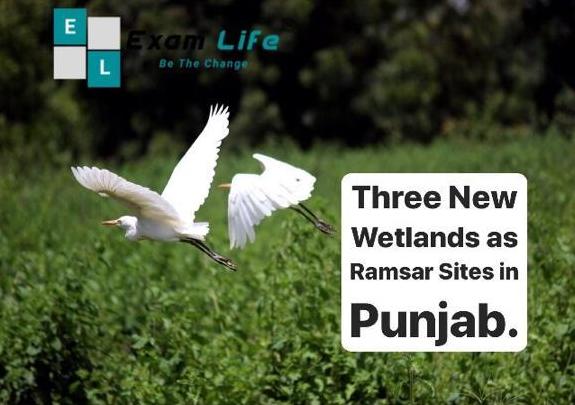Topic: Biodiversity and environment
Punjab gets three more wetlands as Internationally recognised Ramsar sites.
What is the Ramsar Convention?
- This convention on wetlands was signed in 1971 in a small Iranian town called Ramsar.
- This treaty was the first modern treaty between nations aimed at conserving natural resources.
- The Ramsar Convention’s broad aims are to stop the worldwide loss of wetlands and to conserve, through wise use and management, those that remain.
- A wide variety of natural and human-made habitat types ranging from rivers to coral reefs can be included as wetlands.
The three newly included ones are:-
- Keshopur Community reserve. ( GURDASPUR).
- Beas conservation reserve, 7 districts.
- Nangal wildlife sanctuary( Ropar ).
Other three Ramsar sites in Punjab are:-
- Harike
- Kanji
- Ropar.
Punjab has 1381 mapped wetlands.
Also, it has 5049 small wetlands.
The total wetland area in the state is around 1.71 % of the state’s total area.
This announcement came ahead of International Wetlands day, which falls on February 2.
This step would really benefit the state as:-
- It would boost eco-tourism in Punjab.
- More hospitality-based Industries could emerge in the state.
- More foreign exchange and other resources could be garnered.
- Conservation of critically endangered species could be beefed up e.g Gharials.
- Employment in the services sector could be increased.
- Forestry and green belts could be promoted for furthering the eco-tourism potential.
About the new wetlands of Ramsar convention:-
- Keshopur wetlands:-
- Spread over 343.9 hectares.
- It is a natural wetland.
- It is the only habitat for Sarus and common cranes in the state.
2. Beas Conservation Reserve:-
- It is spread over 7 districts of Punjab:
Hoshiarpur.
Gurdaspur.
Amritsar.
Jalandhar.
Kapurthala.
Tarn Taran.
Ferozepur.
- It spreads over 185 km stretch of the Beas river starting from Talwara to Harike headworks.
- It is the only reserve that hosts Indus river dolphins.
- The Gharials reintroduction project was also undertaken here.
3. Nangal wildlife sanctuary:-
- An area of 116 hectares.
- It is a man-made wetland, which came into existence as a. Result of the Bhakra Nangal project in 1961.
Criteria to be declared as Ramsar site:-
Learn more
(Source:- The Tribune)






0 Comments